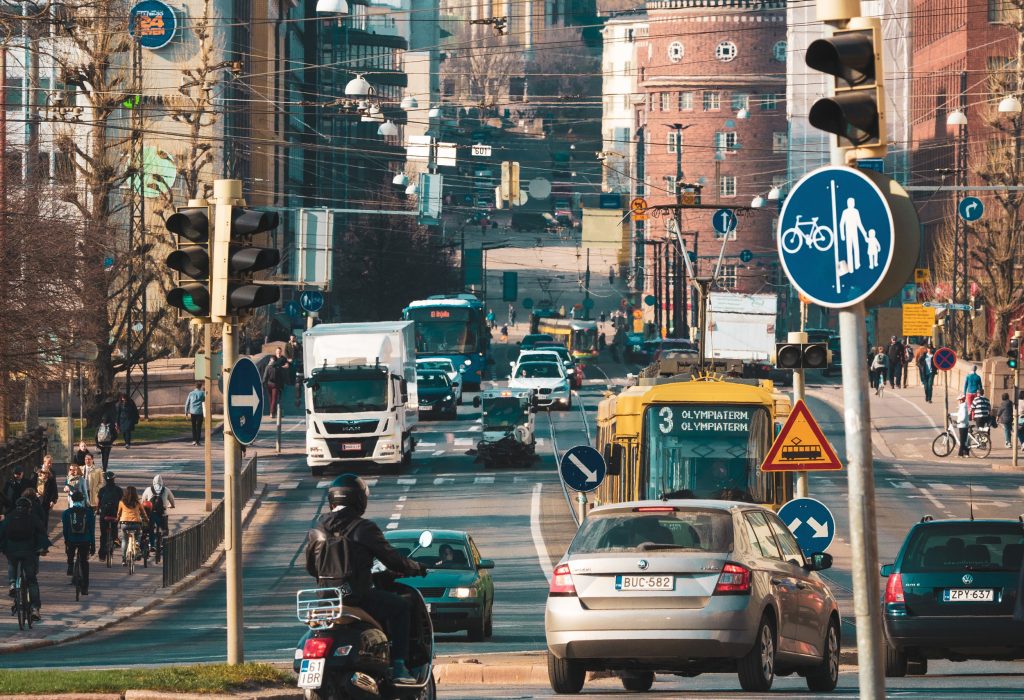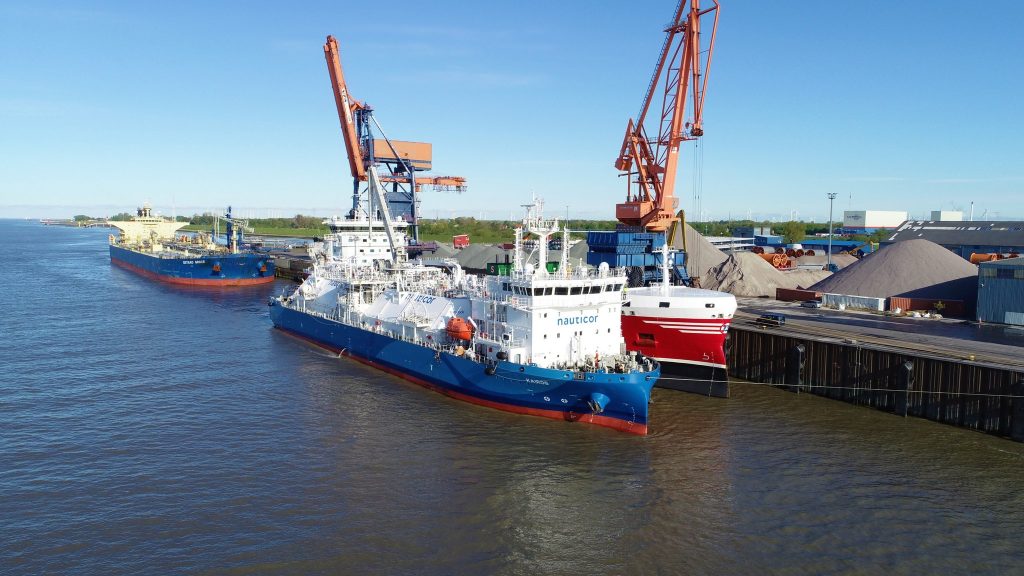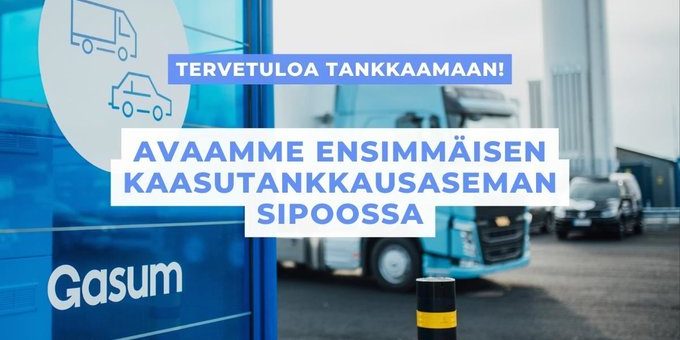Gasum has opened the first natural gas filling station in Sipoo, a municipality that is part of the Helsinki metropolitan area. The new facility is located in the Bastukärr Logistics Park and will particularly improve the possibilities for logistics operators and heavy-duty transport in the area to reduce their emissions and fuel costs with the help of CNG.
The Bastukärr park is one of Finland’s largest logistics hubs and thousands of heavy-duty vehicle combinations pass through the park each week. The new station will give increasingly more transport companies serving logistics in the Finnish grocery trade a chance to switch to using natural gas in their deliveries.
“The opening of a new station in in the Bastukärr Logistics Park is a natural continuation of the growing recognition of the benefits of gas among logistics operators. We are enabling more and more companies to switch to gas-powered vehicles and are constantly examining potential sites for new filling stations. Ensuring the convenient location of stations for our customers makes it increasingly easier to switch to cleaner logistics,” commented Olli Paasio, Director, Traffic Finland at Gasum.
One of the biggest actors in Bastukärr Logistics Park is Inex Partners Oy, which is responsible for the provision of warehousing and transportation services for the grocery and consumer goods chain of the S Group. The company’s logistics centers in Bastukärr are part of a network covering the whole of Finland through which products are delivered to S Group stores. Around 1,000 vehicles of different sizes visit the logistics centers each day.
Inex aims to reduce its transportation emissions by 20% by 2025. To achieve this goal, one of the measures in transportation is increase the amount of alternative and renewable fuels such as biomethane. Made from recycled fractions, this biofuel also strengthens the company’s role as a circular economy actor and an enabler of the circular economy in the S Group.
”The S Group’s responsibility program commits us to Finland’s ambitious emissions goals. The Bastukärr filling station will have an important role in helping us to reach these goals. Its excellent location means that we will be able to increasingly take advantage of environmentally friendly in the S Group’s transportations. The benefits are considerable, since while lowering emissions in Finnish road traffic, we are also lowering the overall carbon footprint of the products ending up on the shelves,” said Jouni Jaakola, head of production at Inex Logistics.

Finland organizes forum to address transition to fossil-free heavy transport
The Finnish Ministry of Transport and Communications organized a round table on the green transition in heavy transport, to hear the views of various interest groups on the needs of heavy-duty vehicles and heavy transport in general when mobility is moving towards a fossil-free era. The discussion also focused on the current situation in the fuel markets, EU legislation related to fuels and vehicles as well as forms of support that promote the green transition in heavy transport.
In May 2021, the Government adopted a resolution on a roadmap to fossil-free transport, which lists actions to reduce the greenhouse gas emissions from road transport. With regard to heavy-duty vehicles, the objective for 2030 is approximately 4,600 electric buses and trucks and approximately 6,200 natural gas buses and trucks. Other goals include a significant improvement in the coverage of natural gas refueling infrastructure. There are currently 11 LNG or bio-LNG refueling stations and nearly 70 CNG or bio-CNG stations.
In May, the Ministry of Transport and Communications appointed a working group to coordinate distribution infrastructure for new alternative transport fuels. At the moment, the majority of kilometers in heavy transport is driven with diesel.
The distribution obligation is currently the most important measure that promotes the use of renewable energy in heavy transport. Moreover, the green transition in heavy transport is promoted by supporting new transport fuels that offer alternatives to fossil fuels. “In addition to electricity, we also need other fuels. For example, the national biogas program aims at using the full biogas production potential. Especially the biofuel distribution obligation has reduced the greenhouse gas emissions of domestic transport efficiently,” said Minister of Transport and Communications Timo Harakka.
In addition to the distribution obligation, emissions reduction measures include the improvement of vehicle energy efficiency and the reduction of kilometers driven. Thus far, the energy efficiency of passenger cars has developed more quickly than that of heavy-duty vehicles. Background factors include the EU’s ambitious emissions limits for new passenger cars and vans.
The green transition is promoted with many different forms of support. For example, EUR 2 million is reserved for purchase support for electric vans in the 2022 budget. Support for converting cars to use natural gas or ethanol as fuel has been continued in 2022 and work to explore opportunities to expand conversions to vehicles other than passenger cars has started. In addition, many EU funding programs provide support for the green transition.
The implementation of the three-phase roadmap to fossil-free transport is under way. On 7 April, the Ministerial Working Group on Preparedness decided on the green transition package for 2022 and 2023. As part of the package, funding was allocated to measures included in the roadmap to fossil-free transport. Additional funding amounting to EUR 4 million will be reserved for purchase support for electric and natural gas trucks (Ministry of Transport and Communications).

Baltic Sea Commitment: cargo ship wastewater can be used to produce biogas
There are around 2,000 cargo ships with an estimated 25,000 seafarers sailing on the Baltic Sea at any given time. The greywater and sewage generated on these vessels can be legally discharged into the Baltic Sea. Gasum aims to determine the volume of wastewater ending up in the Baltic Sea and to study the potential to use it in biogas production. Under its Baltic Sea Commitment, Gasum is participating in the BSAG Ship Waste Action, which began in last year autumn in the port of HaminaKotka, and aims to reduce loading in the Baltic Sea in conjunction with shipping.
Gasum commits to receive ship-generated wastewater and biowaste as a feedstock for biogas, a renewable, low-emission fuel that when liquefied can be used in maritime transport. Besides biogas, the process produces recycled nutrients that can replace synthetic and virgin nutrient products in agriculture and industry. Both the production of biogas and the recovery and commercialization of nutrients support security of supply and reduce dependence on imported raw materials. Besides this, Gasum commits to influence within its own industry in the role of partner to strengthen the circular economy with regard to ship-generated wastes.
”Gasum is a Nordic energy company and a strong circular economy actor. For us, the Ship Waste Action is a great opportunity to promote circular economy solutions and to work for the good of the Baltic Sea. Cooperation with other actors is important to discharge ship-generated waste into a port from where it can be recovered for use. Besides renewable energy production, we want to promote the agricultural use of recycled nutrients created in the biogas process. We are using carbon footprints to assess the climate impacts of nutrient products in the project,” said Elina Saarivuori, Sustainability Manager, Gasum.
“Whereas our priority is to get wastewaters generated by cargo ships discharged on land instead of into the Baltic Sea, that is just the first step. Since the very beginning of the Ship Waste Action, it has been important to us to find a use for wastewaters in the circular economy. Producing biogas from wastewaters is an excellent solution as far as the Baltic Sea is concerned,” commented Elisa Mikkolainen, Project Director at Baltic Sea Action Group.
Ship Waste Action is cooperation where cargo ship sewage is used for circular economy purposes. Other partners in the project besides Gasum are the Port of HaminaKotka, Kymen Vesi wastewater treatment plant, Autoyhtymä Vuorinen, shipping companies Meriaura and RABN, Essberger & Stolt Tankers, Utkilen and Maersk, as well as shipbrokers C&C Port Agency, Dahlberg’s Agency and GAC Finland. Operations are currently on going in Rauma port and being expanded to other ports also.







